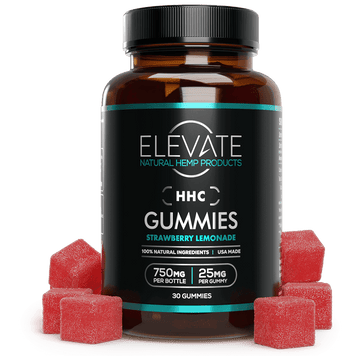Can You Fly With THC Gummies: What The Law Actually Says

Hemp-derived (legal): Gummies with less than 0.3% Delta 9 THC are federally legal. TSA permits them.
Marijuana-derived (illegal federally): Standard THC gummies from dispensaries are federally illegal. TSA will report to law enforcement.
The problem: TSA cannot distinguish between legal hemp and illegal marijuana gummies.
Safest approach: Carry COAs proving compliance, or leave THC products at home.
Table of Contents
- Key Takeaways:
- Understanding THC Gummies: What Travelers Need To Know
- TSA Guidelines On Flying With THC Gummies In 2025
- Domestic Flights: Can You Fly With THC Gummies Between States?
- International Flights: Flying With THC Gummies Abroad
- What Happens If TSA Finds Your THC Gummies?
- Safe Tips For Traveling With Legal Hemp CBD Or Low-THC Gummies
- Final Thoughts
- Frequently Asked Questions About Can You Fly With THC Gummies
Key Takeaways:
-
Federal Law Governs TSA and Airports: Only approved products—such as those that are FDA-approved or meet federal standards and contain less than 0.3% THC—are considered legal for air travel. THC gummies exceeding 0.3% THC are illegal under federal law, regardless of state legalization. Keep this in mind when traveling through airports, as TSA isn't actively searching for cannabis but must report it if discovered.
-
State Laws Do Not Apply at TSA Checkpoints: Federal law governs TSA screenings and airport security even if you're flying from a cannabis-legal state. This can result in confiscation or fines if THC gummies are detected.
-
Traveling Internationally with THC Gummies is Risky: International laws are often far stricter, and possession of THC gummies could lead to severe penalties, including fines or imprisonment. Many countries have zero tolerance for cannabis or THC, regardless of dose size or where you bought it. Always research the legal status of THC products in your destination country before traveling.
Traveling with THC gummies sounds easy—just toss a few in your bag and go, right? But once you start thinking about airport security, TSA checkpoints, and federal laws, things get a lot more complicated. Can you fly with THC gummies without risking fines, confiscation, or worse?
Before you head to the airport with edibles tucked away in your carry-on, you need to know what the law really says. Being informed could mean the difference between a stress-free trip and a serious headache you didn't plan for.
In this guide, we'll break down everything you need to know about flying with THC gummies, including what's allowed, what's risky, and how you can protect yourself before takeoff.
Understanding THC Gummies: What Travelers Need To Know
THC gummies are small, chewy candies infused with tetrahydrocannabinol (THC), the psychoactive compound found in cannabis. THC gummies are a type of cannabis product, and laws for cannabis products, including edibles, vary by region. These edibles have gained popularity as a flavorful and discreet way to experience the effects of THC without smoking or vaping. Designed to be easy to consume and transport, they offer a convenient option for those seeking relaxation, mood upliftment, or relief while on the go.
The legality of THC gummies, particularly during travel, is something consumers need to take seriously. Laws surrounding cannabis products, including edibles, can vary significantly between regions and countries, complicating the ability to transport them across borders. Even within the United States, where individual states have differing legislation on THC and cannabis products, federal law maintains a blanket prohibition on marijuana. This discrepancy creates potential legal conflicts, especially in airports where federal law takes precedence.
Shop Here: Delta 8 Gummies For Pain Relief
TSA Guidelines On Flying With THC Gummies In 2025
Currently, TSA (Transportation Security Administration) policies around flying with THC gummies remain tightly aligned with federal law. Cannabis products containing more than 0.3% THC are federally illegal, and airports fall under federal jurisdiction. However, TSA's main focus isn't actively searching for cannabis—their priority is security threats like weapons or explosives. TSA screening procedures are designed to detect potential threats to aviation safety, not just illicit substances. TSA uses various methods, such as X-ray machines and K9 units, to identify potential threats, which may incidentally lead to the discovery of prohibited items like THC gummies. That said, traveling with THC gummies carries legal risks that travelers need to take seriously. Here's what you should know:
TSA Does Not Specifically Search For THC
TSA agents are primarily looking for safety threats. While they're not searching bags specifically for cannabis or edibles, if THC gummies turn up during a security check, agents may discover prohibited substances during routine screening and are obligated to report the discovery to law enforcement.
Legal THC Content Matters
Products derived from hemp that contain less than 0.3% Delta 9 THC on a dry weight basis are federally legal under the 2018 Farm Bill. This means some hemp-derived gummies might technically be allowed. However, most traditional THC gummies exceed this limit and are treated as illegal under federal law when found in airports.
If you're looking for federally compliant options, check out our Delta 9 gummies made from hemp crafted to meet the 0.3% THC threshold and perfect for discreet travel. Only products that are FDA-approved or meet federal standards are considered legal for air travel.
State Laws Do Not Override Federal Law
Even if you're flying out of a state where cannabis is fully legal, federal rules apply once you step into the airport. Your departure or destination state's cannabis laws don't protect you at TSA checkpoints or on federally regulated flights.
Possible Outcomes If THC Gummies Are Found
If TSA finds THC gummies that appear to violate federal law:
-
They'll refer the matter to local airport police.
-
A law enforcement officer will determine the next steps based on their discretion and local policies.
-
In some cases, law enforcement may simply confiscate the items; in others, travelers could face fines or more serious consequences.
Domestic Flights: Can You Fly With THC Gummies Between States?
Outcomes vary depending on the state's cannabis laws when you fly domestically with THC gummies—legal states may overlook small amounts, while non-legal states could impose fines or arrests. Travelers also need to consider airline policies, which often prohibit cannabis, and the fact that gummies being mistaken for regular candy isn't a reliable defense.
Federal Vs. State Law Conflict
Federal law prohibits THC gummies exceeding 0.3% THC in both carry-on and checked luggage, regardless of whether you're flying between cannabis-legal states. Airports operate under federal jurisdiction, so state legalization (like in California or Colorado) doesn't protect you from TSA or federal regulations.
TSA Screening Procedures
TSA officers focus on security threats, not drug enforcement; these procedures are in place to ensure everyone's safety on the plane. Still, they're obligated to report suspected cannabis products to law enforcement if found during X-ray scans, manual searches, or K9 sweeps. Gummies may resemble regular candy, but detection could still lead to confiscation or further action, depending on the airport's location.
State-Specific Consequences
If THC gummies are discovered, local law enforcement handles the situation based on state laws. In cannabis-legal states, small amounts for personal use might be ignored or confiscated with a warning. In states where cannabis remains illegal, travelers could face fines, arrest, or criminal charges depending on local enforcement practices.
Airline Policies
Many airlines prohibit cannabis products in their terms and conditions, regardless of state or federal law. If caught, you could face removal from the flight, denied boarding, or even bans from future travel with that airline. Always check your airline's specific policies before attempting to fly with any cannabis products.
International Flights: Flying With THC Gummies Abroad
International travel with THC gummies is significantly riskier than domestic travel. While U.S. laws are complex, other countries often have stricter regulations with harsh penalties for cannabis possession. Here's what you need to know before considering international travel with THC products:
Stricter International Laws
Many countries maintain zero-tolerance policies for cannabis, regardless of THC content or the product's legal status in your home country. Possession of even small amounts can result in severe consequences, including hefty fines, imprisonment, or deportation. Countries in Asia, the Middle East, and parts of Europe are particularly strict about cannabis laws.
Customs Declarations
When entering another country, you're required to declare all items you're bringing. Failing to declare THC gummies can result in additional penalties beyond those for simple possession. Being caught with undeclared cannabis products at customs is taken extremely seriously.
Research Is Essential
Before traveling internationally, thoroughly research the cannabis laws in your destination country. What's legal or tolerated in one place might carry a mandatory prison sentence in another. Don't assume that because something is legal where you're from, it will be accepted elsewhere.
What Happens If TSA Finds Your THC Gummies?
Understanding what happens if TSA discovers THC gummies in your luggage can help you prepare for the situation. While every encounter is different, here's the general process:
-
Initial Detection: TSA will notify you that an item is being flagged during screening. This is usually handled discreetly, so other travelers won't necessarily be aware of the situation.
-
Item Examination: TSA will examine the gummies and assess whether they could be considered a security risk. Since they don't have equipment to test THC levels, they won't be able to determine the exact contents right there.
-
Local Law Enforcement: Since THC remains federally illegal, TSA is obliged to notify local law enforcement. The local police will then step in to handle the situation according to the state laws at your point of departure.
-
Possible Outcomes: The consequences may vary significantly depending on where you are. In states where recreational cannabis is legal, law enforcement officers might simply confiscate the items, inform you of the regulations, and let you continue your journey. However, stricter states may enforce penalties ranging from fines to more severe legal consequences.
-
Your Rights: Stay calm and courteous throughout the process. You have the right to remain silent and request legal counsel if necessary. Being informed of the specific laws and your rights in both your departure and arrival states can help you navigate this situation.
While every TSA interaction is unique, understanding these steps can ease your mind if you ever find yourself in this situation, allowing you to continue your journey as smoothly as possible.
Safe Tips For Traveling With Legal Hemp CBD Or Low-THC Gummies
For those planning to travel with their hemp-derived CBD or low-THC gummies, sticking to legal guidelines can ensure a smooth and worry-free experience. Here are several practical tips to keep in mind when flying with these products:
Understand Federal Vs. State Laws
Before traveling, familiarize yourself with federal and state laws regarding hemp and low-THC products. Federally legal hemp products must contain less than 0.3% THC, but state regulations can vary widely. Make sure your products comply with regulations at both your departure and arrival destinations.
Check Airline Policies
While hemp-derived products might be legal, it's smart to review the specific policies of the airline you'll be flying with. Airlines can have different rules about carrying any form of cannabis, regardless of its legal status.
Keep Documents Handy
Travel with documentation such as a certificate of analysis (COA) or lab report that verifies the product's THC content. This can help clear up any misunderstandings with security personnel.
Be Discreet And Secure
Choose packaging that doesn't draw attention and make sure your gummies are stored securely and tamper-proof. Original packaging can often provide clarity about the contents and intended use.
Prepare For A Security Screening
During TSA screening, openly present your hemp-derived products rather than concealing them. TSA isn't specifically searching for cannabis, but having your products in transparent containers can help speed up the process.
Know about: Delta 8 Vape Disposable
Know Your International Travel Rules
If traveling internationally, look into specific restrictions on hemp and THC products in your destination country, as regulations can be even stricter outside the U.S., and possession could lead to serious consequences.
If you prefer a milder alternative, Delta 8 gummies offer a smoother experience
Following these tips can make traveling with hemp CBD or low-THC gummies easier and more enjoyable, removing the stress so you can focus on the journey ahead.
Final Thoughts
Flying with THC gummies isn't as simple as tossing them into your bag and hoping for the best. While TSA's main focus is on security threats, not cannabis, federal law still prohibits traveling with THC products that exceed 0.3% THC. Even in cannabis-legal states, airports operate under federal rules, and consequences can vary widely depending on where you are and where you're going.
For non-edible options, explore our Delta 8 pre-rolls
If you choose to travel with hemp-derived gummies or low-THC products, preparation is key: understand the laws, keep proper documentation, and always comply with airline policies. Being informed is the best way to minimize risks and keep your travels smooth, legal, and stress-free.
Read also:
-
Different Types Of THC: A Guide To Delta 8, Delta 9, THCA, And More
-
THCA Flower Vs. THC Flower: How They Compare In Effects And Legality
Frequently Asked Questions About Can You Fly With THC Gummies
Are the rules the same for medical marijuana patients and recreational users?
The regulations for flying with THC gummies differ between medical marijuana patients and recreational users at the state level. While some states have enacted policies that provide certain legal protections for medical patients, federal law applies universally, meaning both categories must adhere to federal regulations during air travel.
Does TSA actively look for THC products at airports?
TSA's primary mandate is ensuring security, which means they're not specifically searching for drugs. However, if THC products are found during security checks, they're obliged to report them to local law enforcement authorities. Cannabis-derived gummies, typically purchased at state-licensed dispensaries, are not allowed on planes regardless of state legality.
How much THC can legally be in your possession for air travel?
Under federal law, THC products are illegal, so technically, possessing any amount can result in legal consequences. Keep in mind that the discretion of local authorities in individual airports can vary widely, so there's no consistent rule regarding tolerated amounts.
Can you face federal charges for flying with THC gummies?
Yes, federal law governs air travel, and cannabis is classified as a Schedule I controlled substance, potentially making travelers liable for federal charges if caught in possession of THC products.
Can dogs at airports detect THC gummies?
Drug detection dogs at airports are trained to identify various substances, including THC. However, their focus is typically on major security threats. That said, trained canines can detect THC.
Is it safer to fly with THC gummies or CBD gummies?
Flying with CBD gummies generally represents less legal risk since many CBD products contain negligible amounts of THC. Make sure the CBD gummies comply with regulations by having less than 0.3% THC, aligning with federal guidelines under the 2018 Farm Bill.
Join Our Newsletter
Sign up to be the first to know about our can't-miss product drops, special VIP offers & exclusive discounts.







